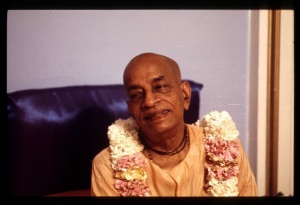CC Madhya 8.232 (1975): Difference between revisions
(Vanibot #0027: CCMirror - Mirror CC's 1996 edition to form a basis for 1975) |
(Vanibot #0020: VersionCompareLinker - added a link to the Version Compare feature) |
||
| Line 2: | Line 2: | ||
<div style="float:left">'''[[Sri Caitanya-caritamrta (1975)|Śrī Caitanya-caritāmṛta (1975)]] - [[CC Madhya (1975)|Madhya-līlā]] - [[CC Madhya 8 (1975)|Chapter 8: Talks Between Śrī Caitanya Mahāprabhu and Rāmānanda Rāya]]'''</div> | <div style="float:left">'''[[Sri Caitanya-caritamrta (1975)|Śrī Caitanya-caritāmṛta (1975)]] - [[CC Madhya (1975)|Madhya-līlā]] - [[CC Madhya 8 (1975)|Chapter 8: Talks Between Śrī Caitanya Mahāprabhu and Rāmānanda Rāya]]'''</div> | ||
<div style="float:right">[[File:Go-previous.png|link=CC Madhya 8.231 (1975)|Madhya-līlā 8.231]] '''[[CC Madhya 8.231 (1975)|Madhya-līlā 8.231]] - [[CC Madhya 8.233 (1975)|Madhya-līlā 8.233]]''' [[File:Go-next.png|link=CC Madhya 8.233 (1975)|Madhya-līlā 8.233]]</div> | <div style="float:right">[[File:Go-previous.png|link=CC Madhya 8.231 (1975)|Madhya-līlā 8.231]] '''[[CC Madhya 8.231 (1975)|Madhya-līlā 8.231]] - [[CC Madhya 8.233 (1975)|Madhya-līlā 8.233]]''' [[File:Go-next.png|link=CC Madhya 8.233 (1975)|Madhya-līlā 8.233]]</div> | ||
{{CompareVersions|CC|Madhya 8.232|CC 1975|CC 1996}} | |||
{{RandomImage}} | {{RandomImage}} | ||
==== TEXT 232 ==== | ==== TEXT 232 ==== | ||
<div class="verse"> | <div class="verse"> | ||
:nāyaṁ śriyo | :nāyaṁ śriyo 'ṅga u nitānta-rateḥ prasādaḥ | ||
:svar-yoṣitāṁ nalina-gandha-rucāṁ kuto | :svar-yoṣitāṁ nalina-gandha-rucāṁ kuto 'nyāḥ | ||
:rāsotsave | :rāsotsave 'sya bhuja-daṇḍa-gṛhīta-kaṇṭha- | ||
:labdhāśiṣāṁ ya udagād vraja-sundarīṇām | :labdhāśiṣāṁ ya udagād vraja-sundarīṇām | ||
</div> | </div> | ||
| Line 20: | Line 19: | ||
<div class="synonyms"> | <div class="synonyms"> | ||
na—not; ayam—this; śriyaḥ—of the goddess of fortune; aṅge—on the chest; u—alas; nitānta-rateḥ—who is very intimately related; prasādaḥ—the favor; svaḥ—of the heavenly planets; yoṣitām—of women; nalina—of the lotus flower; gandha—having the | na—not; ayam—this; śriyaḥ—of the goddess of fortune; aṅge—on the chest; u—alas; nitānta-rateḥ—who is very intimately related; prasādaḥ—the favor; svaḥ—of the heavenly planets; yoṣitām—of women; nalina—of the lotus flower; gandha—having the aroma; rucām—and bodily luster; kutaḥ—much less; anyāḥ—others; rāsa-utsave—in the festival of the rāsa dance; asya—of Lord Śrī Kṛṣṇa; bhuja-daṇḍa—by the arms; gṛhīta—embraced; kaṇṭha—their necks; labdha-āśiṣām—who achieved such a blessing; yaḥ—which; udagāt—became manifest; vraja-sundarīṇām—of the beautiful gopīs, the transcendental girls of Vrajabhūmi. | ||
</div> | </div> | ||
| Line 27: | Line 26: | ||
<div class="translation"> | <div class="translation"> | ||
" 'When Lord Śrī Kṛṣṇa was dancing with the gopīs in the rāsa-līlā, the gopīs were embraced around the neck by the Lord's arms. This transcendental favor was never enjoyed by the goddess of fortune or other consorts in the spiritual world. Nor was such a thing ever imagined by the most beautiful girls from the heavenly planets, whose bodily luster and aroma exactly resemble a lotus flower. And what to speak of worldly women who are very beautiful according to the material estimation?' " | |||
</div> | </div> | ||
| Line 34: | Line 33: | ||
<div class="purport"> | <div class="purport"> | ||
This is a quotation from Śrīmad-Bhāgavatam ([[SB 10.47.60]]). | This is a quotation from Śrīmad-Bhāgavatam ([[SB 10.47.60|10.47.60]]). | ||
</div> | </div> | ||
Latest revision as of 20:02, 27 January 2020

A.C. Bhaktivedanta Swami Prabhupada
TEXT 232
- nāyaṁ śriyo 'ṅga u nitānta-rateḥ prasādaḥ
- svar-yoṣitāṁ nalina-gandha-rucāṁ kuto 'nyāḥ
- rāsotsave 'sya bhuja-daṇḍa-gṛhīta-kaṇṭha-
- labdhāśiṣāṁ ya udagād vraja-sundarīṇām
SYNONYMS
na—not; ayam—this; śriyaḥ—of the goddess of fortune; aṅge—on the chest; u—alas; nitānta-rateḥ—who is very intimately related; prasādaḥ—the favor; svaḥ—of the heavenly planets; yoṣitām—of women; nalina—of the lotus flower; gandha—having the aroma; rucām—and bodily luster; kutaḥ—much less; anyāḥ—others; rāsa-utsave—in the festival of the rāsa dance; asya—of Lord Śrī Kṛṣṇa; bhuja-daṇḍa—by the arms; gṛhīta—embraced; kaṇṭha—their necks; labdha-āśiṣām—who achieved such a blessing; yaḥ—which; udagāt—became manifest; vraja-sundarīṇām—of the beautiful gopīs, the transcendental girls of Vrajabhūmi.
TRANSLATION
" 'When Lord Śrī Kṛṣṇa was dancing with the gopīs in the rāsa-līlā, the gopīs were embraced around the neck by the Lord's arms. This transcendental favor was never enjoyed by the goddess of fortune or other consorts in the spiritual world. Nor was such a thing ever imagined by the most beautiful girls from the heavenly planets, whose bodily luster and aroma exactly resemble a lotus flower. And what to speak of worldly women who are very beautiful according to the material estimation?' "
PURPORT
This is a quotation from Śrīmad-Bhāgavatam (10.47.60).